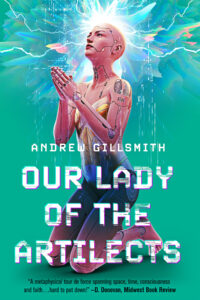
Because my judging team for the fourth annual Self-Published Science Fiction Competition (SPSFC4) had an unusually light group of quarterfinalists, I spent the end of the stage catching up on some quarterfinalists from other teams. And one that particularly caught my eye was the supernatural sci-fi Our Lady of the Artilects by Andrew Gillsmith.
Our Lady of the Artilects takes place two centuries into the future of Earth—perhaps an alternate history Earth—in which a reconstituted Holy Roman Empire and sect-bridging Muslim Caliphate have become geopolitical powers and much of the world has turned to androids for labor. But when one of the androids claims to be possessed by a demon, it sets off a high-stakes struggle intimately involving both science and religion.
Our Lady of the Artilects is striking for the vast geopolitical differences between its world and ours, but it offers little in the way of a bridge between them. There are gestures at wars that calcified alliances into empires, but this is not a story about the way that various sects of Islam overcame their differences or a Catholic power arose spanning from Vienna to the Philippines (with nary a mention of North America at all). That’s all backstory, and while it may catch the eye, I strongly suspect this story is better enjoyed by readers who are willing to view the politics as a “what if” scenario than by those trying to trace clear lines from our world to the world of the book.
Instead, Our Lady of the Artilects is interested in the intersection of big questions in science and religion (and though there are Muslim characters, the religion side of the equation is explored almost exclusively from a Catholic perspective). What is the relationship between sentience and the soul, and what are the theological implications of artificial sentience? This is undoubtedly a work of science fiction—there would be no story without artificial intelligence—but it’s also a supernatural story, taking the Christian account of the divine as fact and working through its implications in a science fiction context.
That sort of story may not appeal to everyone, but as someone who grew up on supernatural thrillers (mostly by evangelical authors), I made a pretty friendly audience for the author’s main project. The android possession made for a quick and compelling hook, and the quality of the storytelling was high enough to make for easy immersion in the early stages of the story.
Unfortunately for me, I have lost my taste for thrillers over the years, and after an intriguing hook, Our Lady of the Artilects spends a good chunk of the middle of the story tightly following the sci-fi thriller formula. Everybody wants a piece of the androids, with the Emperor sending an enforcer to protect the priest performing the exorcism and ultimately allying with the Caliphate against a hidden opponent with unknown designs. There’s a fair bit of fighting and a fair bit of globe-trotting in search of both safety and answers. And while these segments aren’t poorly-written, they also just don’t offer the freshness of the original premise.
But while the chases may run a bit long for my taste, the story does ultimately return to its roots in a crisis at the intersection of the supernatural and the scientific with far-reaching implications for humanity—and AI—writ large. There’s a satisfying investigation subplot as the leads try to figure out just what is coming at them, and the ultimate confrontation has little to do with who employs the best assassins and so much to do with the nature of the soul and the scientific and spiritual implications of beings possessing one. It certainly demands a comfort with the Christian conception of the supernatural that not all readers will share, but it provides a satisfying conclusion that truly does pay off the big themes it promises in the beginning.
I’m a little bit less convinced by the characterization, with conflict between the lead and his ex that relies on an interpersonal backstory that gets enough page time to be hard to ignore but doesn’t quite get enough for me to find it believable. Much like the worldbuilding, this is an aspect where the story would have been better off saying less and let the reader interact with the state of things as they are rather than spending time trying to build up the plausibility of the current state of affairs. Because ultimately, this is a book about conspiracies, about souls, and about science, and it doesn’t need intensive worldbuilding or character backstories to accomplish its primary aims.
Our Lady of the Artilects isn’t my favorite of the books I’ve read from SPSFC4, but it’s one that I found compelling on the whole. Some of the background material requires the reader to not think too hard about it, and it spends a bit too much time on thrilling chases, but it offers a quick hook, an engaging investigation story, and a conclusion that does justice to the big questions it raises at the intersection of the supernatural and the scientific.
Recommended if you like: supernatural thrillers and also sci-fi.
Can I use it for Bingo? It’s hard mode for Prologues and Epilogues and Multi-POV, and it’s also Self-Published, First in a Series, Features Dreams, and has a setting Under-the-Surface.
Overall rating: 14 of Tar Vol’s 20. Four stars on Goodreads.
